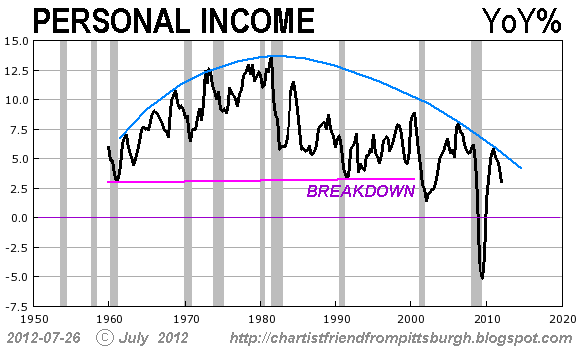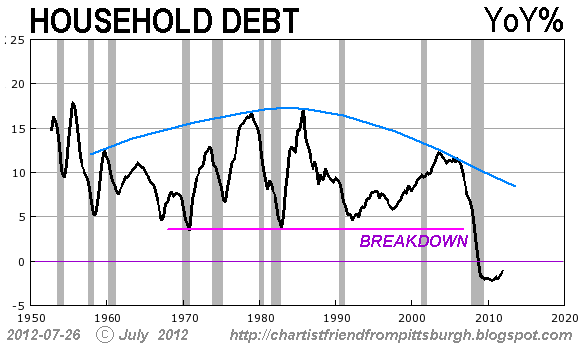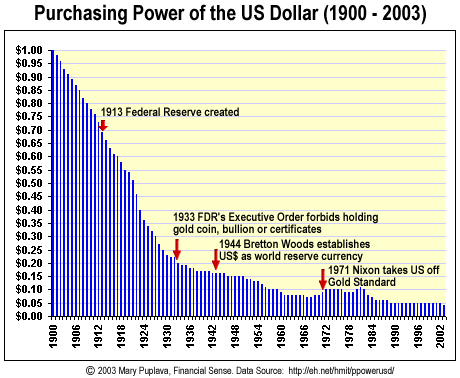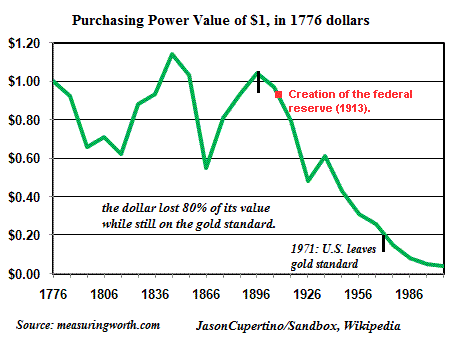The market considers a variety of inputs in pricing the value of a floating currency. The dollar has more going for it than is generally understood.
The conventional view looks at the domestic credit bubble, the trillions in derivatives and the phantom assets propping the whole mess up and concludes that the only way out is to print the U.S. dollar into oblivion, i.e. create enough dollars that the debts can be paid but in doing so, depreciate the dollar's purchasing power to near-zero.
This process of extravagant creation of paper money is also called hyper-inflation.
While it is compelling to see hyper-inflation as the only way out in terms of the domestic credit/leverage bubble, the dollar has an entirely different dynamic if we look at foreign exchange (FX) and foreign trade.
Many analysts fixate on monetary policy as if it and the relationship of gold to the dollar are the foundation of our problems. These analysts often pinpoint the 1971 decision by President Nixon to abandon the gold standard as the start of our troubles. That decision certainly had a number of consequences, but 80% the dollar's loss of purchasing power occurred before the abandonment of dollar convertibility to gold.
The depreciation from 1971 on looks rather modest on this chart. Clearly, dropping the convertibility of the dollar to gold did not change the overall depreciation dynamic much; the dollar had been losing purchasing power since the turn of the century.
Here is the dollar's purchasing power plotted by another source. Note how the purchasing power fluctuated significantly in the 19th century. The emergence of the (privately owned) Federal Reserve as the issuer of the dollar accelerated the dollar's depreciation--a decline interrupted only by the deflationary Great Depression.
To understand the dollar's primary role as a means of exchange for trade, let's start with the relative size of the foreign exchange market. The FX markets trade some $2 trillion a day, far larger than either the credit or stock markets.
Fiat currency is the ultimate phantom asset. It is quite miraculous when you think about it. We print some symbols and images on a piece of paper, and we can exchange that intrinsically worthless paper for real goods and materials: oil, electronics, vehicles, and so on. That magic privilege is certainly worth maintaining.
So why would anyone trade real tangible wealth (say, oil) for specially printed paper? There are basically three reasons:
1. They can use the paper to buy goods and services from other nations.
2. They can buy bonds with the paper money that will draw interest and be paid as promised.
3. When the money is withdrawn to exchange for goods and services, it has retained the vast majority of the purchasing power it held when deposited.
If we look at the charts above, we might wonder why anyone would accept U.S. dollars (USD) as payment for real goods when it so steadily loses purchasing power. The answer can be found by re-reading the three conditions above: if the USD draw interest, and that income is larger than the loss of purchasing power, then the money will still retain its purchasing power when withdrawn.
For instance, if the USD deposits draw 5% annual interest and the USD loses 3% of purchasing power every year, the owner of the dollar still earned a 2% positive return.
There is another interesting feature of interest-bearing bonds: as interest rates decline, the bond rises in value. This sets up the delicious irony of the Chinese whining about their $1 trillion in U.S. Treasury bonds earning such low yields, while in fact their holdings have greatly increased in value as interest rates have declined.
But what underpins a fiat currency's purchasing power? Ultimately, the value of any paper (free-floating) currency is based on the issuer's ability to enforce claims on reliably stable income streams and assets.
Any nation that promises to pay interest on bonds denominated in its currency must be able to enforce its claim on the national income via taxation. If the national income is too unreliable or unstable to support the claim, the international community loses faith in the currency and it depreciates to zero even if the currency isn't printed with abandon.
In other words, the value of the currency as an international means of exchange is not just a function of monetary policy or money supply; the market "prices" a free-floating currency on a number of factors, all related to the three above points.
We all understand gold is an asset. The key to understanding Nixon's decision to break the international convertibility of the dollar to gold was the transition of the U.S. from a net exporter to a net importer.
In the 1960s, France famously demanded that the trade imbalance between the U.S. and France be settled in gold: when the U.S. ran a trade deficit with France, the "amount due" France had to be paid in gold.
Once U.S. domestic oil production peaked and it became necessary to import oil, the U.S. became a net importer in a deeply structural sense. With the dollar convertible to gold, eventually the exporting nations would have ended up with all the U.S.'s gold, and that was not going to happen.
The solution was to float the dollar and trade paper money for the oil.
(There is another fundamental reason why the U.S. became a net importer not just of oil but of finished goods and raw materials, and we'll look at that later.)
But the magic of trading paper for oil could only be maintained if the paper retained the vast majority of its purchasing power over typical investment timeframes.
In this, the U.S. held the immense advantage of issuing the reserve currency, i.e. paper money accepted globally for payment of debts. But this privilege was not magic; the currency still had to reliably draw interest and retain its purchasing power.
Ultimately, the USD retains its value based on the U.S. government's claim to the nation's immense income stream, its assets and its ability to attract international capital.
We can understand the market's "pricing" of these variables by asking: if we had to hold a currency for trading purposes, i.e. to settle debts resulting from global trade, and we needed to hold some of that currency for five years, which currency would be most likely to retain its purchasing power, based on the income stream, assets and capital flows of the issuing nation?
This question illuminates the varied nature of assets. Yes, gold and oil are assets; but so is enabling the free flow of international trade, for example. We can ask the question somewhat differently: is it within the power of the currency's issuer to mandate its purchasing power five years hence? How much of the market's "pricing" is outside the control of the issuer?
Take the euro as an example. Does anyone seriously believe the European Central Bank (ECB) retains sufficient global control over the euro's valuation to mandate its value five years hence? The currency's viability is in question even now, never mind in five years.
Clearly, much of the market's pricing of the euro's value is outside the control of the euro's issuers; whether they admit it or not is irrelevant.
In a similar fashion, China dares not let the renminbi float lest the market "price in" the instabilities implicit in China's economy and trade. If we were able to tote up true capital flows out of China, it is entirely possible that capital flows have reversed, and more capital is flowing out of China into the U.S. than is flowing from the U.S. to China.
If we don't understand capital flows are assets, then we understand neither capital flows nor what constitutes an asset.
How about Japan? The yen is currently viewed as a "safe haven" due to the great stability and wealth of Japan. But two decades of massive deficit spending and debt accumulation are finally putting pressure on Japan, Inc., and those willing to bet the yen will retain its current purchasing power for five more years are taking on an extraordinary amount of risk that has yet to be priced into the yen.
Once again, the question boils down to how much of the yen's purchasing power is in the hands of its issuers. For 20 years, Japan's domestic purchases of its own debt kept the global market at bay. As domestic savings rates dry up and the ageing Baby Boomers start cashing in their bonds and drawing pensions, the system may finally be exposed to global market "pricing" of risk. That exposure could destabilize the yen's position as "safe haven."
Whatever your calculus, it is self-evident that of all the issuers of major currencies, the U.S. retains the most control over the elements the market uses to "price" the risk that the dollar's value as a means of exchange and store of value is unsettled.
There is yet another way to understand the market's valuation of the dollar, and any other floating currency. If you are holding a large amount of a nation's currency, the ultimate value of that currency can be discovered by what you can buy in the issuer's nation with its paper money. If restrictions on foreign ownership crimp what you can buy, the currency's value reflects that. If there is relatively little of value to buy, or the risks of ownership are high, then once again the market will mark down the "price" of that currency.
Despite its myriad problems and challenges, the U.S. allows a fairly broad range of foreign ownership of land, corporations, etc. If you have surplus dollars, you can buy property or an oil well in the U.S. It may not produce much oil, but the output can be sold domestically and its value is relatively easy to calculate. The U.S. economy is vast and there's a wide variety of things and assets to buy with your dollars. In other words, there is a vast market that will accept your dollars in exchange for tangible goods and assets.
I have made the case technically for over a year that the U.S. dollar has reversed its long downtrend and is now in a structural advance. If we examine the multiple dynamics of FX, foreign trade and the market's pricing of currencies, we can discern a strong fundamental case for this advance as well. There is no magic in free-floating currencies, there is only the market discovering the price of numerous inputs, only some of which are easily quantifiable.
This was drawn from Musings Report 30. The Musings are sent weekly to subscribers and major contributors ($50 or more annually). Here are some samples of the Musings.
 Resistance, Revolution, Liberation: A Model for Positive Change (print $25)
Resistance, Revolution, Liberation: A Model for Positive Change (print $25)
(Kindle eBook $9.95)
We are like passengers on the Titanic ten minutes after its fatal encounter with the iceberg: though our financial system seems unsinkable, its reliance on debt and financialization has already doomed it.We cannot know when the Central State and financial system will destabilize, we only know they will destabilize. We cannot know which of the State’s fast-rising debts and obligations will be renounced; we only know they will be renounced in one fashion or another.
The process of the unsustainable collapsing and a new, more sustainable model emerging is called revolution.Rather than being powerless, we hold the fundamental building blocks of power. We need neither permission nor political change to liberate ourselves. A powerless individual becomes powerful when he renounces the lies and complicity that enable the doomed Status Quo’s dominance.
| Thank you, James B. ($10/month), for your stupendously generous subscription to this site--I am greatly honored by your support and readership. |
Read more...
 Resistance, Revolution, Liberation: A Model for Positive Change (print $25)
Resistance, Revolution, Liberation: A Model for Positive Change (print $25)





























